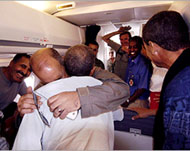Moroccans demand prisoner release
A mass demonstration has been staged in Rabat in support of Moroccan prisoners of war held by the Polisario Front in camps southwest of Algeria.

Around one million protesters from all around the kingdom massed in the Moroccan capital on Sunday to urge the release of about 450 Moroccan prisoners still held by the Polisario Front.
The prisoners are held at detention camps in Tinduf, the main military base of the Algeria-backed guerrilla movement seeking independence of the Western Sahara region from Morocco.
The initiative was organised by a Moroccan non-government organisation Watanuna (Our Nation).
Watatuna was set up on 20 January in Casablanca to draw international attention to what it called the inhuman conditions in which Moroccan prisoners are being held.
Aljazeera’s reporter in Rabat, Hasan Rashidi, said all sectors of Moroccan society participated in the demonstration.
Some of the detainees have been held for almost three decades now, he said.
Polisario reaction
The Polisario Front, also known as the Popular Front for the Liberation of Saguia el Hamra and Rio de Oro, waged a 15-year war of attrition against the central Moroccan government.
 |
|
A few Moroccan prisoners of war |
Hostilties came to an end in 1991 when a UN-sponsored ceasefire went into effect and a peacekeeping force, UN Mission for a Referendum in Western Sahara (Unminurso), was deployed to the region.
On Sunday, the Polisario Front accused Moroccan authorities of being behind the march.
In a statement released from Addis Ababa, the group said Watatuna was a creation of the Moroccan government with a view to reflecting the official stand on the prisoners issue.
International appeal
Nearly 2400 Moroccans were taken prisoner before both Morocco and Polisario accepted the 1991 ceasefire.
The International Committee of the Red Cross (ICRC) and the United Nations Organisation have repeatedly urged for the repatriation of the Moroccan prisoners.
They are described by some humanitarian organisations as the world’s longest-serving prisoners of war.
Delegates of the ICRC visit prisoners twice a year in order to assess the conditions in which they are held and their physical and mental health.
Last January, a Moroccan soldier died after two days of his repatriation to Morocco by the ICRC.
Muhammad Lahmadi, who remained captive for 17 years, was seriously ill when he was repatriated and died in a military hospital in the southern Moroccan city of Marrakech.
Aljazeera’s Ahmad Amrawi contributed to this report